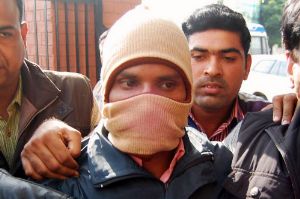
New Delhi, Jan 13: The accused in the series of blasts linked to Hindu terror had also participated in the 2002 Gujarat riots that claimed over 1,600 lives. Investigations by the National Investigation Agency (NIA) have found that some of those accused in blasts such as the Samjhauta Express, Hyderabad's Mecca Masjid, Ajmer Dargah and Malegaon had gone to Gujarat during the 2002 riots on the instructions of slain RSS pracharak Sunil Joshi.
The new revelation shows that the radicalized group's tilt towards violence had begun much before they started exploding bombs in Muslim-dominated places like Malegaon and Hyderabad.
Sources said, Lokesh Sharma, who has been arrested in connection with the Samjhauta Express and 2006 Malegaon blasts, has revealed during interrogations that following the burning of 59 kar sevaks in a train near Godhra in February, 2002, by Muslim fundamentalists, there was lot of pent-up anger among right-wing Hindu groups even in Madhya Pradesh. As the riots broke out in Gujarat, Joshi asked Lokesh to head to Gujarat and participate in the riots, sources said.
"Lokesh has said that he duly followed the orders and also killed several people during the riots as part of a mob," said an official privy to the interrogation. Lokesh, however, is not aware if Joshi himself or others in the group also took part in the riots.
NIA, however, suspects that if Joshi had sent Lokesh, he could have asked others close to him to carry out a similar task. Other accused in NIA's custody, however, have not revealed any information as yet on this. Rajender Chaudhary, Manohar Singh, Dhan Singh and Lokesh Sharma are in NIA custody in connection with several blasts.
"Initially, however, there actions were not well organized or coordinated and most acted independently. Although, their extreme radicalization had begun after the 1992 Babri Masjid demolition," said the official.
However, the first recorded anti-minority crime against the group members traces back to 2001, when they had shot a nun in the face from a running bike on Ujjain-Dewas road in MP. This was followed by participation in Gujarat riots, and then lobbing a grenade at a mosque in Jammu in 2004 that led to death of two persons and 15 others getting injured.
It was in 2004 that the group first got organized under the leadership of Pragya Singh Thakur, who had called the accused to Ujjain Kumbh Mela and discussed carrying out coordinated attacks on minority religious places and gatherings. What followed was a series of attacks and blasts ranging from 2005 bid on the life of acquitted accused in 2001 Parliament attack case SAR Geelani in Delhi, blasts in Malegaon in 2006, Samjhauta Express, Ajmer Dargah and Mecca Masjid in 2007, and again in Malegaon in 2008.






Comments
Add new comment